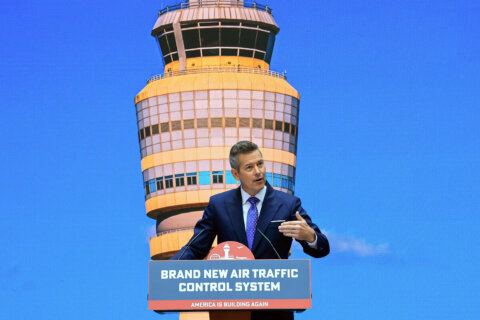WASHINGTON — The man campaigning for Metro to allow people with service animals to use emergency gates has won his fight, according to a letter sent Monday.
“I am pleased to inform you that Metro has established a safety accommodation standard operating procedure (SOP) to allow customers traveling with service animals to use the equipment gates to enter or exit the system upon request,” wrote Christian Blake, director of the Office of ADA Policy and Planning at Metro.
The change is effective immediately.
Ryan Honick said the fare gates that comply with the American with Disabilities Act were clipping and injuring his service dog, Pico. He was concerned that Pico would become afraid to ride Metro. Honick, who was born with cerebral palsy, uses a wheelchair and depends on Pico for everyday tasks.
The latest incident happened Oct. 13 when Honick tried to leave the Eisenhower Avenue station through the emergency exit. The station manager refused access and Honick asked to speak with her supervisor. The supervisor agreed to let Honick exit through the emergency gate, but told him to contact Metro because the policy did not allow it.
Metro agreed to investigate the matter, but also issued a statement defending the practice.
“Without prejudging the outcome of our review, I can say that the ADA gates are designed specifically to accommodate passengers with disabilities, including those who use service animals, and thousands of riders use the gates every day without any issue,” the statement said.
According to Metro, a customer can request a reasonable accommodation under ADA, and those requests are reviewed by its Access Services Department.
“Emergency gates are for that stated purpose — i.e. for emergencies — and not intended for routine entry and exit to the system,” Metro spokesman Dan Stessel wrote on Friday.
Honick believes there are a few reasons Metro reversed the policy.
“I think initially there was some resistance to this change,” Honick said. “There just needed to be more of an understanding and appreciation of why I was fighting this so deeply. I think now that that understanding has happened, I’m glad Metro has taken the right steps here.”
Honick also credits the power of social media for the outcome. He tweeted his complaint last week, then several Metro critics re-tweeted him, leading to several news outlets, including WTOP, to pick up on the story.
Corbett Price, a D.C. representative on the Metro Board of Directors, also played a key role in the policy reversal. Price congratulated Honick in a tweet on Monday, writing that “we need more people like you.”
Honick is optimistic that the problem is now resolved, although he will keep the letter with him just in case.
“It was the right thing to do in order to be responsive to the needs of the riders,” Price said. “Metro has a lot of silos. This fell into one of those silos and this needed a silo buster.”







